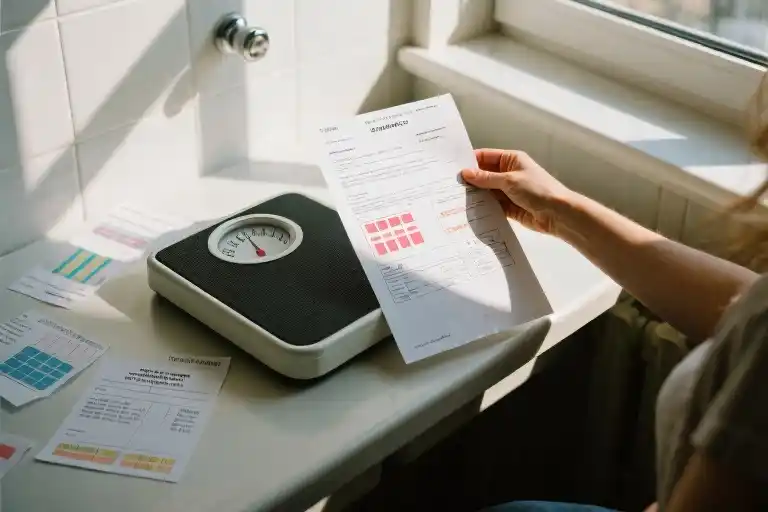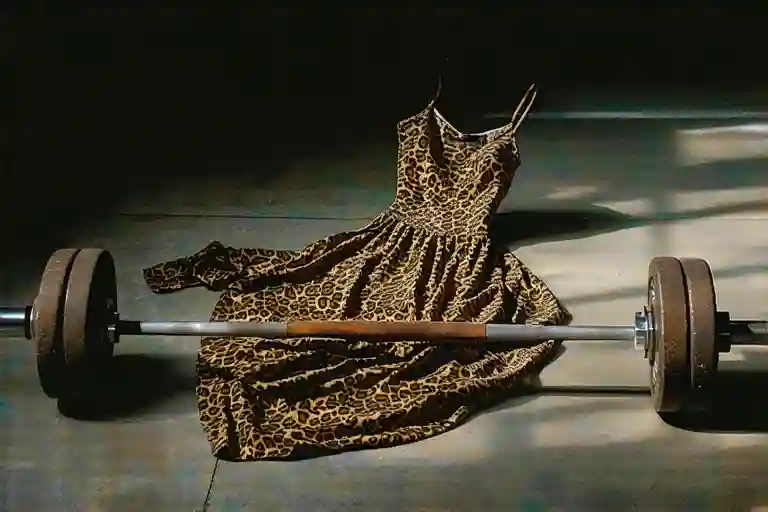The compliments came in waves at my in-laws’ golden anniversary party. “You look so well, Charlie,” they said—aunts, uncles, cousins I hadn’t seen since last Christmas. Their eyes lingered approvingly on my frame, their smiles widening with each repetition of that loaded phrase.
Six months ago, these same relatives would have greeted me with polite hugs and weather talk. The difference now? Twenty-three pounds gone from the scale, vanished under doctor’s orders to lower my cholesterol. Never mind that my hands still shake from iron deficiency, that I haven’t slept through the night since perimenopause began its stealth invasion, that my fertility specialist’s last report sits folded in my wallet like a grenade.
Health, it seems, has become a visual shorthand. The narrowing of my waistline overwrites blood test results in the collective imagination. When the third cousin remarked how “radiant” I looked, I caught my reflection in the hallway mirror—the same shadows under my eyes, the new tension around my mouth. But the arithmetic of societal approval is simple: smaller body equals improved worth.
I’ve lived this equation from both sides. At my lightest during college, strangers held doors longer. At my heaviest postpartum, nurses assumed my exhaustion was just “new mom tiredness” rather than the thyroid storm my lab work revealed. The body keeps its own ledger of pains and imbalances, one that rarely aligns with the numbers on our clothing tags.
Our cultural obsession with thinness as a virtue has roots deeper than Instagram algorithms. I grew up watching talk show segments measuring celebrity “weight sins,” memorizing calorie counts from teen magazine quizzes that promised happiness in smaller dress sizes. Two decades later, we’ve swapped fat-free yogurt for keto pancakes but kept the same dangerous calculus: that a woman’s wellness can be assessed from across a room.
The truth sits in my medical file—pages of hormonal fluctuations and nutrient deficiencies that no amount of weight loss can cure. Yet here we are, at another family gathering, where my value gets measured in disappearing pounds rather than surviving another week of menopausal bleeding. “You look so well” echoes like a spell meant to conjure actual health from mere appearance. If only bodies worked that way.
When ‘Getting Thinner’ Becomes Synonymous with Health
The compliments came like clockwork at my in-laws’ anniversary party. “You look so well, Charlie,” they’d say, with that particular head-tilt of concern masquerading as praise. These were relatives who hadn’t seen me since the holidays, when my cheeks were rounder and my sweater size larger. The unspoken subtext hung heavier than any holiday fruitcake: my improved appearance directly correlated to the numbers on my bathroom scale.
What fascinates me isn’t their kindness – that’s always been there – but how their tone shifted. The same aunt who last year tactfully suggested joining her yoga class now gushed about my ‘glow.’ My brother-in-law, who used to lecture me about prediabetes over Christmas ham, suddenly found my salad choices inspiring rather than irritating. Their eyes tracked not my energy levels (still flagging) nor my skin tone (still pale from low iron), but the new hollows beneath my cheekbones.
My medical charts tell a different story. The same bloodwork that prompted my doctor’s urgent “we need to get these lipid levels down” now elicits congratulations from acquaintances. That hemoglobin count still hovering below normal? Irrelevant compared to my newly visible collarbones. Even my gynecologist, while reviewing my menopausal bleeding patterns, couldn’t resist adding, “At least you’ve lost that extra weight” as if shrinking my body somehow balanced the scales of my failing reproductive system.
This cultural equation – thinness equals health – persists despite overwhelming medical evidence to the contrary. My endocrinologist keeps a framed Harvard study above her desk showing that nearly 40% of normal-weight adults have metabolic abnormalities, while 30% of obese individuals show optimal markers. Yet when my own lipid panel came back with troubling numbers, the first recommendation wasn’t dietary changes or stress reduction, but a referral to a popular weight loss app.
We’ve been conditioned to scan bodies like nutrition labels, assuming less always means more – more vitality, more discipline, more worth. I catch myself doing it too, assessing grocery store strangers’ carts with unwarranted scrutiny. It’s the legacy of 90s diet culture whispering that celery sticks equal moral superiority, that hunger pangs are just ‘willpower growing pains.’
The cruel irony? My current ‘ideal’ weight stems from illness, not wellness. The brain fog keeping me from remembering basic words? Still there. The insomnia leaving me groggy at 3 PM? Unchanged. But now these symptoms get framed as charming quirks rather than concerning red flags, because society reads slimness as self-care rather than what it often is – a side effect of suffering.
Perhaps what we need isn’t another diet plan, but a new vocabulary. One where ‘health’ describes blood values rather than body shapes, where compliments focus on someone’s stamina rather than their silhouette. Until then, I’m practicing responses that redirect the conversation: “Thank you, but my doctor and I are actually more focused on my iron levels these days.” It’s a small act of rebellion against the assumption that shrinking bodies always equal expanding health.
The Two Faces of Weight Bias
There’s a particular kind of whiplash that comes with occupying different bodies in the same lifetime. Six years ago, when I wore two dress sizes larger, I attended a cousin’s wedding where relatives I’d known since childhood walked past me three times before recognition dawned. Last month at that anniversary party, those same people crossed rooms to compliment me. The only thing that changed was the number on my clothes tag.
This isn’t just personal anecdote – Harvard’s Workplace Weight Discrimination Study found women perceived as overweight earn $9,000 less annually than thinner peers in comparable roles. Yet when those same women lose weight, they’re suddenly ‘more professional,’ ‘disciplined,’ even ‘smarter.’ The math never adds up: if thinness reflects virtue, why did my cholesterol improve while my iron levels plummeted during the same weight loss?
I keep two photos on my phone from eighteen months apart. In the first, taken at my heaviest, I’m grinning after completing a half-marathon – a fact nobody asked about when they saw the picture. The second shows me gaunt with insomnia during my worst menopause weeks, captioned ‘You’re glowing!’ by seventeen Instagram followers. Our cultural lens distorts reality like carnival mirrors, reflecting back only what we’ve been trained to see.
Office dynamics reveal these biases in microcosm. As a marketing director, I noticed client meetings went smoother when I wore fitted blazers versus flowy tunics, though my presentations were identical. A 2018 Yale study confirmed this phenomenon, showing investors preferred pitch deliveries from thinner female entrepreneurs regardless of content quality. We’ve conflated body size with capability so thoroughly that even other women participate unconsciously – my own mother once praised a colleague’s ‘willpower’ after her gastric bypass, ignoring the clinical depression that followed.
What nobody mentions about yo-yo weight is the psychological whiplash. You learn which friendships were conditional on your pants size when ‘You’ve let yourself go’ replaces ‘Let’s do lunch.’ Colleagues who ignored your ideas suddenly seek your opinion on unrelated projects. Strangers hold doors longer, smile more, make eye contact. It’s intoxicating at first, then infuriating – realizing this kindness was always available, withheld until you met arbitrary aesthetic standards.
Perhaps most insidious is how these experiences train us to self-police. Even knowing better, I catch myself judging other women’s plates at business lunches or feeling virtuous for skipping dessert. That internalized voice whispering ‘They’ll respect you more if…’ is the real legacy of 90s diet culture – not just the external judgments, but how we’ve learned to apply them to ourselves and each other.
The cruel irony? Many ‘compliments’ about weight loss come from genuine care. My aunt who gushed over my ‘transformation’ later cried when I explained my insomnia and hair loss. Like most people, she’d never considered that visible change might signal invisible struggle. This cognitive dissonance – wanting to celebrate others while unintentionally upholding harmful norms – is where real change begins. Next time someone says ‘You look great,’ perhaps we might ask, ‘What makes you say that?’ The answers often reveal more about our cultural programming than anyone’s actual health.
How Diet Culture Shaped a Generation of Women
Growing up in the 90s meant being surrounded by glossy magazine covers featuring waistlines you could circle with both hands. A University of Pennsylvania study later confirmed what we instinctively knew – over 90% of fashion models during that era fell below the healthy BMI range. These images weren’t just advertisements; they were instruction manuals for how to occupy space as a woman.
I remember my first diet at twelve, triggered by a boy’s offhand comment about my ‘pudgy’ knees during gym class. That moment crystallized something dangerous – that my body wasn’t mine to inhabit, but a public project open for critique and improvement. We carried calorie counters in our backpacks alongside algebra textbooks, memorizing the energy content of rice cakes like sacred verses.
The language of that era still echoes in women’s health conversations today. Phrases like ‘nothing tastes as good as skinny feels’ or ‘bikini body ready’ weren’t just marketing slogans – they rewired how an entire generation related to hunger, pleasure and self-worth. My gynecologist once remarked that she could accurately guess a patient’s birth decade by their relationship with food: 90s babies apologize for eating crackers during exams, while Gen Z patients more often demand weight-neutral care.
What made this cultural indoctrination particularly insidious was its veneer of health concern. The same magazines promoting 800-calorie meal plans also ran articles about ‘strong being the new skinny’ – though the accompanying photos still showed women whose muscle definition required unsustainable body fat percentages. We internalized the idea that health had a specific look, one that conveniently aligned with patriarchal beauty standards.
Now, as I navigate perimenopause with its very real health challenges, I recognize how those early lessons disconnected me from my body’s actual needs. When blood tests showed concerning iron levels, my first thought wasn’t about nutrition – it was whether the prescribed supplements might cause water retention. Decades of conditioning had taught me to prioritize the appearance of wellness over its substance.
The reckoning with 90s diet culture isn’t about assigning blame, but understanding how these messages became our internal monologues. Like millions of women, I’m learning to distinguish between health behaviors and weight control disguised as self-care. It begins with simple acts: eating when hungry without moral judgment, moving for joy rather than punishment, and – perhaps most radical – believing our bodies when they speak, even when they don’t conform to magazine spreads we grew up worshipping.
Beyond the Scale: Redefining Health Conversations
That moment when someone says “You look so well” with that knowing glance at your waistline—we’ve all been there. The compliment lands like a backhanded gift, wrapped in society’s obsession with thinness. For years, I’d smile politely while screaming internally, knowing my blood test results told a different story entirely.
Navigating the Minefield of Appearance Comments
There’s an art to deflecting weight-focused compliments without causing awkwardness. When my aunt gushed about my “glow” at Thanksgiving (clearly mistaking my anemia-induced pallor for weight loss radiance), I tried a new approach: “I appreciate you noticing, but honestly I’ve been focused on getting my iron levels up—have you ever dealt with fatigue from low ferritin?” The conversation pivoted to real health concerns rather than dress sizes.
These scripts help reclaim discussions about wellbeing:
- The Redirect: “Thanks! I’ve actually been working on my sleep hygiene—did you know poor rest affects cholesterol more than weight?”
- The Reality Check: “That’s kind, though my doctor would say otherwise—we’re troubleshooting my hormone panels right now.”
- The Bridge Builder: “I know you mean well—can we celebrate that I finally found a yoga class I enjoy?”
Five Health Markers More Important Than Your Jeans Size
- Ferritin stores – That “tired all the time” feeling? Could be iron deficiency masquerading as laziness.
- Thyroid function – When my TSH levels fluctuate, no amount of kale smoothies fixes the exhaustion.
- Inflammatory markers – CRP levels reveal what the mirror never shows about bodily stress.
- Sleep architecture – Those 2am wakeups aren’t willpower failures—they’re hormonal shifts needing attention.
- Blood lipid profiles – My “ideal” BMI once hid dangerously high triglycerides.
At my last physical, my GP didn’t mention my weight once. Instead, we discussed why my vitamin D was chronically low and how menopause affects glucose metabolism. That’s the kind of health conversation worth having—one where labs matter more than labels, and vitality isn’t measured in pounds lost but in energy gained.
The scale can’t tell you about the afternoon you played tag with your nieces without needing a nap afterward. It won’t measure the clarity of thought when brain fog lifts, or the joy of uninterrupted sleep. Real health lives in these moments—invisible to the casual observer, priceless to those who’ve reclaimed them.
What If We Stopped Commenting on Women’s Bodies Altogether?
The words still echo in my ears—”You look so well”—from relatives who hadn’t seen me since I’d dropped two dress sizes. Their compliments felt like tiny paper cuts, each one a reminder that society still measures a woman’s worth by the numbers on her scale rather than the complex reality of her health. That anniversary party became a microcosm of everything wrong with how we discuss women’s bodies: the automatic praise for shrinkage, the silence about actual wellbeing.
We’ve all participated in this ritual, haven’t we? The moment someone loses weight, we rush to affirm their improved appearance, as if thinness were some moral achievement. Never mind that my bloodwork shows dangerous lipid levels, that my iron deficiency leaves me breathless climbing stairs, that my hormonal chaos has stolen both sleep and mental clarity. The cultural script demands we celebrate visible weight loss while ignoring invisible suffering.
This reflex to comment—whether meant as kindness or casual observation—carries consequences we rarely acknowledge. When we equate weight loss with health, we reinforce the dangerous myth that bodies can be judged by their silhouette. We erase those fighting chronic illnesses that cause weight gain. We shame those whose medications lead to water retention. We reduce complex human beings to before-and-after photos.
Perhaps it’s time to retire these body comments altogether. Not just the overtly cruel ones, but the seemingly benign observations about appearance changes. What if, instead of remarking on someone’s waistline, we asked about their recent hiking adventures? Instead of praising weight loss, we celebrated their new pottery skills? The shift could be revolutionary in its simplicity.
This isn’t about policing language, but about expanding our vision of what deserves recognition. Real health manifests in energy levels, lab results, mental resilience—none of which are visible in a family photo. My doctor’s concern about my elevated triglycerides matters far more than my mother-in-law’s approval of my slimmer face, yet our cultural priorities remain upside-down.
So here’s my proposal: join me in starting different conversations. When you’re tempted to say “You look great,” pause. Ask instead: “How are you feeling these days?” When someone mentions dieting, redirect: “What’s bringing you joy lately?” These small pivots create space for more meaningful exchanges about actual wellbeing.
And if you’re ready to take the next step, let’s flood social media with a new kind of before-and-after. Post your #RealHealthLooksLike stories—not body transformations, but moments that represent true wellness. Maybe it’s your first full night’s sleep in months. Your blood test showing normal iron levels. The mental health breakthrough no camera could capture. Together, we can redefine what deserves celebration.
Because here’s the uncomfortable truth: every time we praise weight loss without context, we reinforce a system that taught generations of women to shrink their bodies rather than their problems. The change begins when we stop being complicit—one unspoken body comment at a time.





